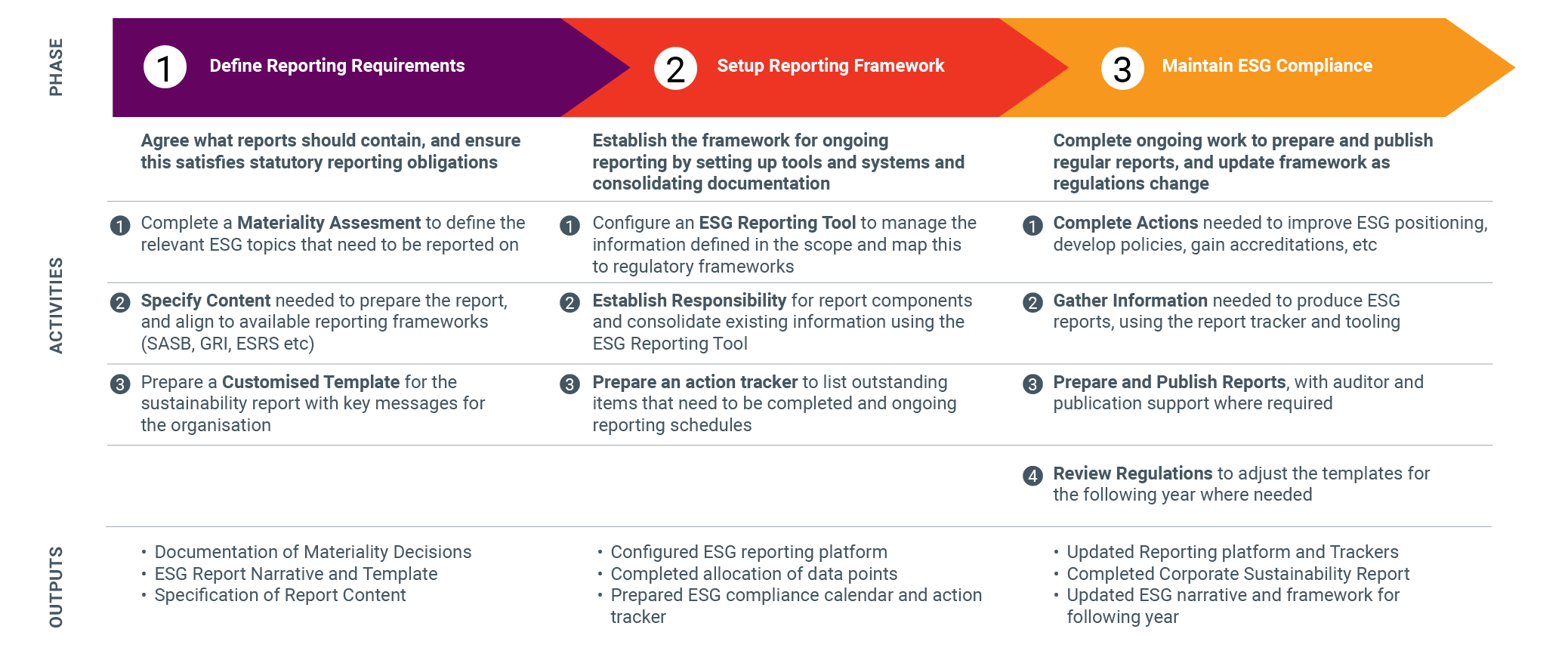ESG reporting in Canada time: to get on board

Canadian investors, clients, employees and, increasingly, regulators are all demanding better insights into organisations’ Environmental, Social and Governance (ESG) performance. As a result, Canada’s businesses are recognising the need for more comprehensive sustainability reporting. How can they ensure that their ESG measurement and disclosures provide a true reflection of performance, along with actionable targets for improvement?
While reporting on ESG performance is not yet mandatory in Canada, it is increasingly demanded by investors, clients and colleagues as a way of gauging their ‘value match’ with companies. Furthermore, ESG reporting is becoming mandatory in several jurisdictions around the world – most notably the European Union, Australia, the United Kingdom and the United States – which has an impact on Canadian companies with operations in these jurisdictions.
Who needs ESG reporting?
Canadian businesses have an opportunity to take the initiative today, and implement comprehensive, integrated ESG reporting as a way of creating value for their investors, clients and colleagues and, ultimately, complying with global regulations.
Investors – private investment funds and pension funds are increasingly required to report on the sustainability of their portfolios, which increases the demands on corporates to provide overviews for consolidation. A recent report from BNP Paribas found that 60% of pension fund managers would not invest in companies that did not provide comprehensive ESG reporting.
Recent examples of ESG disclosure legislation include: the EU’s Sustainable Finance Disclosure Regulation (SFDR) L1, classification of the funds in articles 8 and 9; the EU’s taxonomy reporting MiFID II, integration of sustainable finance; and SFDR L2, reporting on Principal Adverse Impact (PAI) indicators.
Clients – as organisations implement policies on the sustainability of their supply chain, they are increasingly making clear ESG positions a requirement of due diligence when determining which suppliers they will work with. Many requests for proposal (RFPs) contain questions about the potential supplier’s environmental impact, human rights record, and bribery and corruption policies. A March 2023 report from Canadian bank BDC found that the proportion of major buying organisations requiring their suppliers to disclose ESG information is expected to reach 92% in 2024 and, over the next five years, these organisations will increase the number of ESG criteria they require suppliers to report on.
Colleagues – employees increasingly see clear ethical standards as a basic requirement of their employers. In tough labour markets, companies that do not provide detailed ESG reporting may find it difficult to attract new talent.
Regulators – around the world, authorities responsible for defining corporate obligations have been passing legislation that requires much more comprehensive ESG disclosures.
Canada’s ESG regulation train is rolling
Canada has begun its journey to developing and implementing its own mandatory ESG reporting framework. In June 2023 a new sustainability standards body, the Canadian Sustainability Standards Board (CSSB), became operational, hot on the heels of the publication of the International Sustainability Standards Board’s (ISSB) initial ESG reporting standards – IFRS S1 and S2.
The role of the CSSB will be to interpret and support the uptake of ISSB standards in Canada – adapting them to the Canadian context, and ensuring interoperability between ISSB standards and any forthcoming CSSB standards.
Federally regulated financial institutions in Canada, including banks and insurance companies, will have to start ESG reporting in fiscal year 2024.
To shine a spotlight on Canada’s ESG performance over recent years, Statistics Canada has recently introduced an experimental ESG dashboard. This provides an overview of the country’s ESG performance against a number of measures, broken down by industry sector, over recent years.
How should Canadian companies go about getting comprehensive ESG measurement and reporting in place?
ESG reporting is a continuing journey
Of course, ESG reporting is a continuing journey, not a one-off activity. Essentially, three phases of work are needed to define, set up and maintain the reports required for ESG compliance, as shown in the table below.
Preparation of ESG reports involves coordination across a large number of internal and external resources.
External stakeholders define the ESG standards that a company needs to meet. They include:
- regulators – who set mandatory ESG requirements on corporations based on their scale or nature of operations
- shareholders and lenders – who define the standards that portfolio companies need to meet based on their investment policies and regulatory obligations
- clients – who may set standards for their supply chain, based on their own ESG policies and commitments.
Internal personnel are ultimately responsible for managing ESG performance and compliance. They include:
- company executives – who are the ultimate owners of corporate ESG performance, and who approve decisions around ESG positioning, strategy and investments
- internal functions – these include finance, HR, procurement, real estate teams, and others who establish policies on particular ESG topics, and are responsible for driving action and providing data for reports
- insourced ESG administrators – who coordinate and manage ESG reporting, and ensure that actions are tracked, information is collected, and reports are published. They will also usually need to license an ESG reporting platform
External support is typically needed by most companies to help deliver ESG objectives, and includes:
- general ESG advisors – who complete advisory work at a group level to help determine materiality and corporate ESG strategy, and set up reporting frameworks
- auditors – who provide assurance on ESG materiality decisions and reporting disclosures to ensure these are performed to a sufficient standard
- specialist consultants – who complete specialist advisory and execution projects to help deliver particular ESG objectives
- ESG ratings firms – who provide independent assessments, benchmarking, and controls over ESG standards
- ESG reporting platforms – to map reporting standards into accessible tools that can be used to support the collection of information and preparation of reports
- specialist software – to provide specialist tools in support of particular calculations and actions for relevant ESG topics.
How can TMF Group help?
Sustainability reporting is a complex process that requires time and resources that many businesses don't have. As a global provider of ESG administration services, we can help you prepare compliant sustainability reports by providing regulatory expertise and administrative support.
Build accurate ESG reports that investors and stakeholders can trust – learn more about our ESG administration services here.






